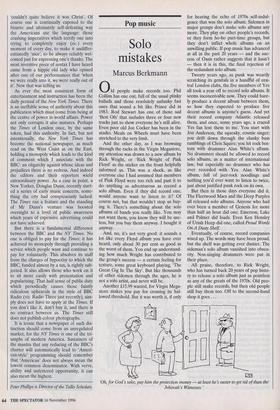Pop music
Solo mistakes
Marcus Berkmann
Old people make records too. Phil Collins has one out, full of the usual plinky ballads and those resolutely unfunky fast ones that sound a bit like Prince did in 1983. Rod Stewart has one of those sad `Best Ofs' that includes three or four new tracks just to show everyone he's still alive. Even poor old Joe Cocker has been in the studio. Meals on Wheels must have been stretched to the very limit.
And the other day, as I was browsing through the racks in the Virgin Megastore, my attention was drawn to a new album by Rick Wright, or 'Rick Wright of Pink Floyd' as the sticker on the front helpfully informed us. This was a shock, as like everyone else I had assumed that members of Pink Floyd were too rich and past it to do anything as adventurous as record a solo album. Even if they did record one, would anyone want to listen to it? Of course not, but that wouldn't stop us buy- ing it. There's something about the solo albums of bands you really like. You may not want them, you know they will be use- less, but you buy them anyway. I bought it anyway.
And, no, it's not very good: it sounds a lot like every Floyd album you have ever heard, only about 30 per cent as good as the worst of them. You end up understand- ing how much Wright has contributed to the group's success — a certain feeling for texture, some great keyboard playing, 'The Great Gig In The Sky'. But like thousands of other sidemen through the ages, he is not a solo artist, and never will be.
Another £15.99 wasted, for Virgin Mega- store makes you pay for crossing its hal- lowed threshold. But it was worth it, if only for hearing the echo of 1970s self-indul- gence that was the solo album. Sidemen in major groups don't make solo albums any more. They play on other people's records, or they form ho-ho part-time groups, but they don't inflict whole albums on an unwilling public. If pop music has advanced at all in the past 20 years — and the suc- cess of Oasis rather suggests that it hasn't — then it is in this, the final rejection of the redundant solo album.
Twenty years ago, as punk was wearily scratching its genitals in a handful of cen- tral London clubs, the five members of Yes all took a year off to record solo albums. It seems inconceivable now. They could bare- ly produce a decent album between them, so how they expected to produce five decent albums is anyone's guess. And yet their record company Atlantic released them, and once, some years ago, a crazed Yes fan lent them to me. You start with Jon Anderson, the squeaky, cosmic singer; you drift down through the clunky bass ramblings of Chris Squire; you hit rock bot- tom with drummer Alan White's album. No drummers should be allowed to record solo albums, as a matter of international law, but especially no drummer who has ever recorded with Yes. Alan White's album, full of jazz-rock noodlings and nothing you'd ever want to listen to twice, just about justified punk rock on its own.
But then in those days everyone did it. The Fleetwood Macs and the Deep Purples all released solo albums. Anyone who had ever been a member of Genesis for more than half an hour did one. Emerson, Lake and Palmer did loads. Even Ken Hensley of Uriah Heep did one, called Proud Words On A Dusty Shelf Eventually, of course, record companies wised up. The words may have been proud, but the shelf was getting ever dustier. The sideman's solo album vanished into obscu- rity. Non-singing drummers were put in their place.
All praise, therefore, to Rick Wright, who has turned back 20 years of pop histo- ry to release a solo album just as pointless as any of the greats of the 1970s. Old peo- ple still make records, but then old people still buy them too. Off to the second-hand shop it goes .
`Oh, for God's sake, pay him the protection money — at least he's easier to get rid of than the Jehovah's Witnesses.'


















































































 Previous page
Previous page